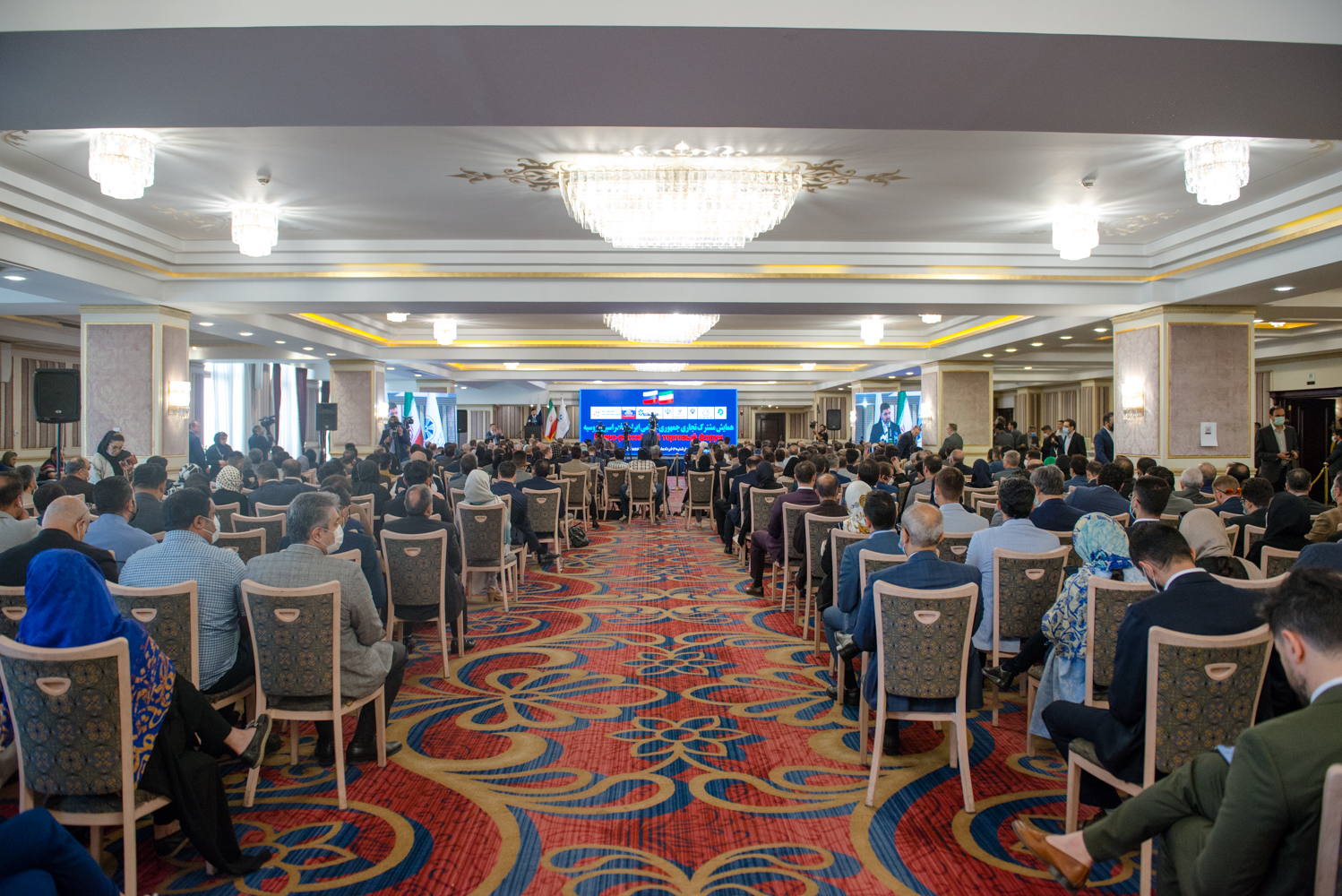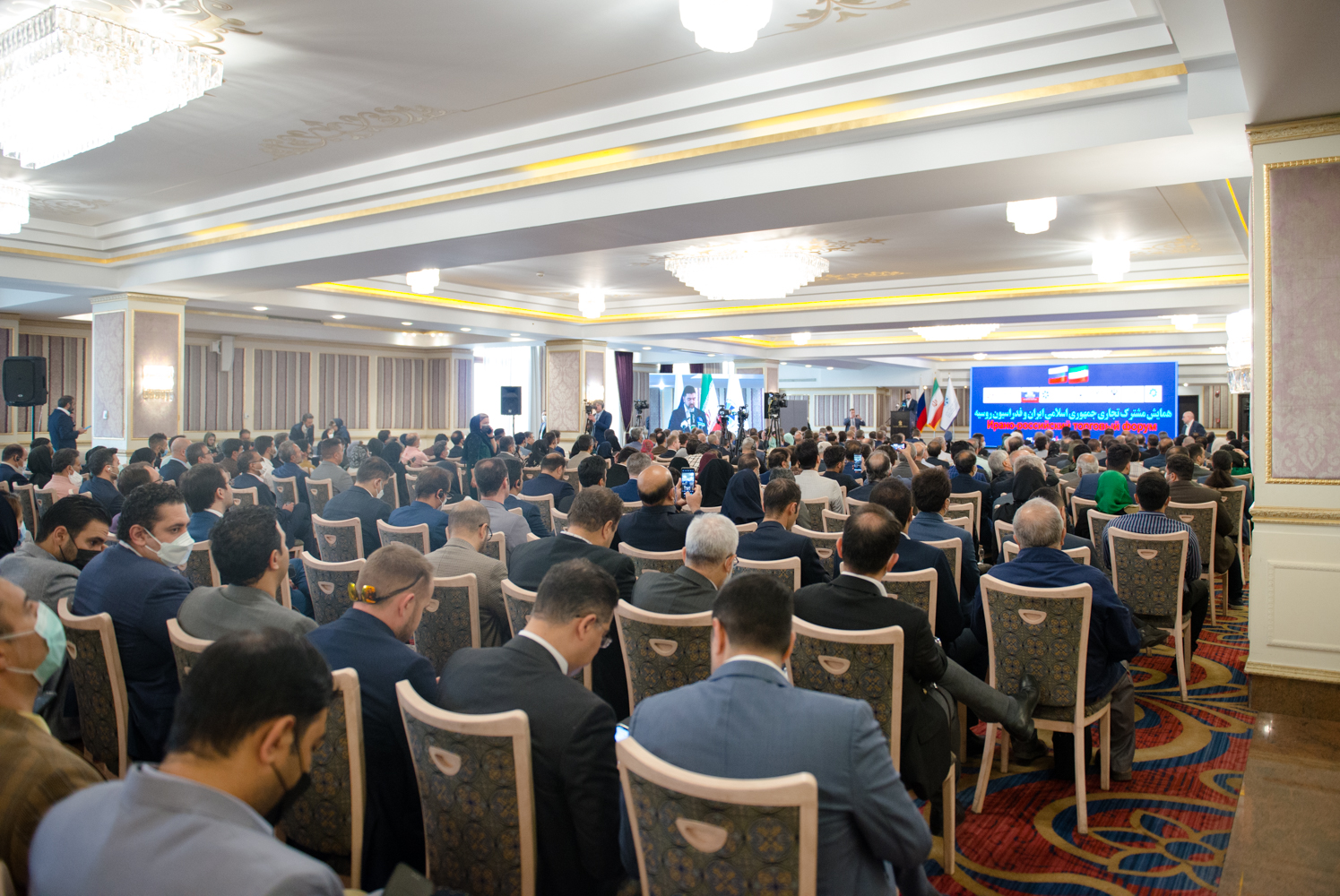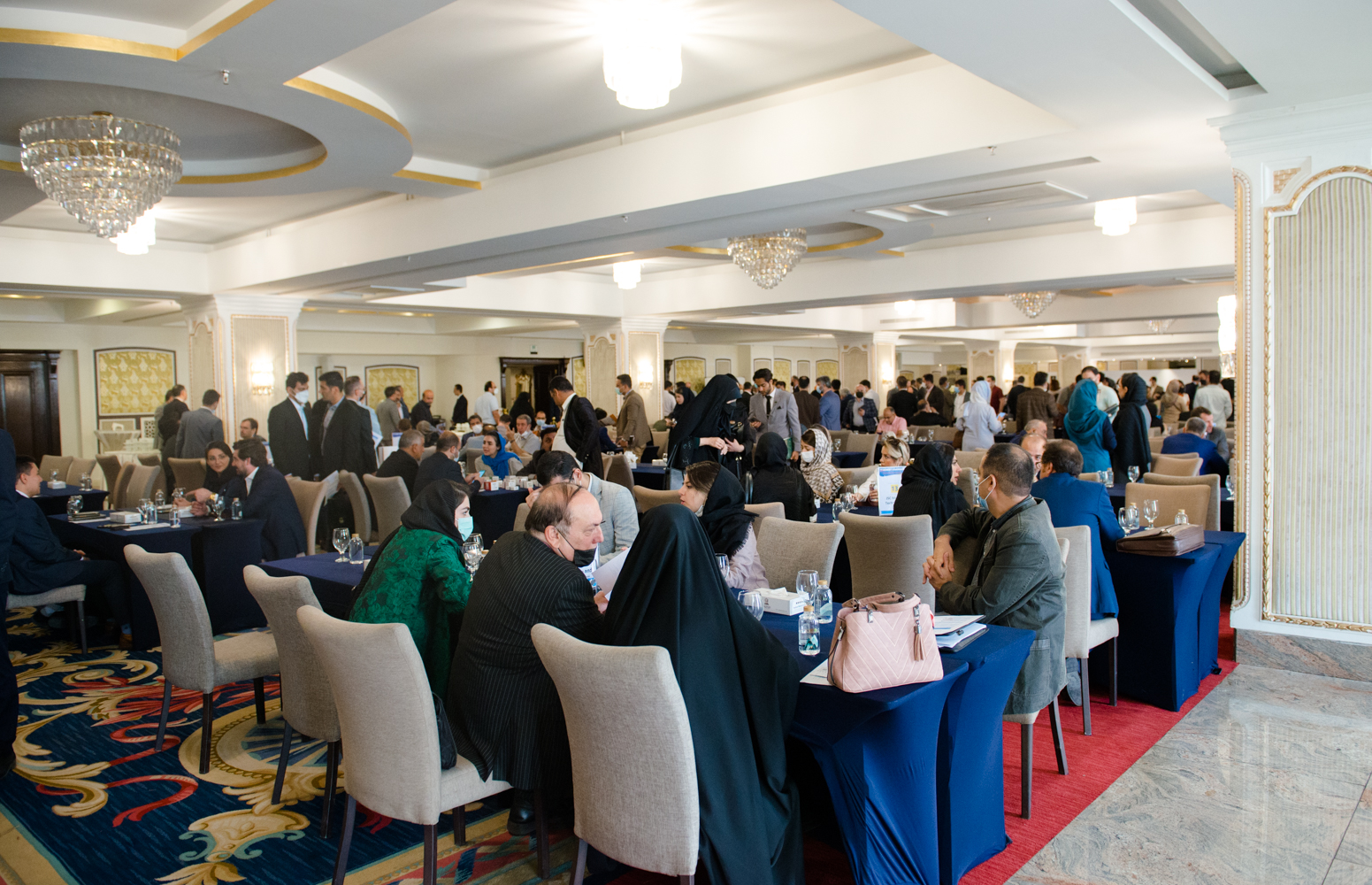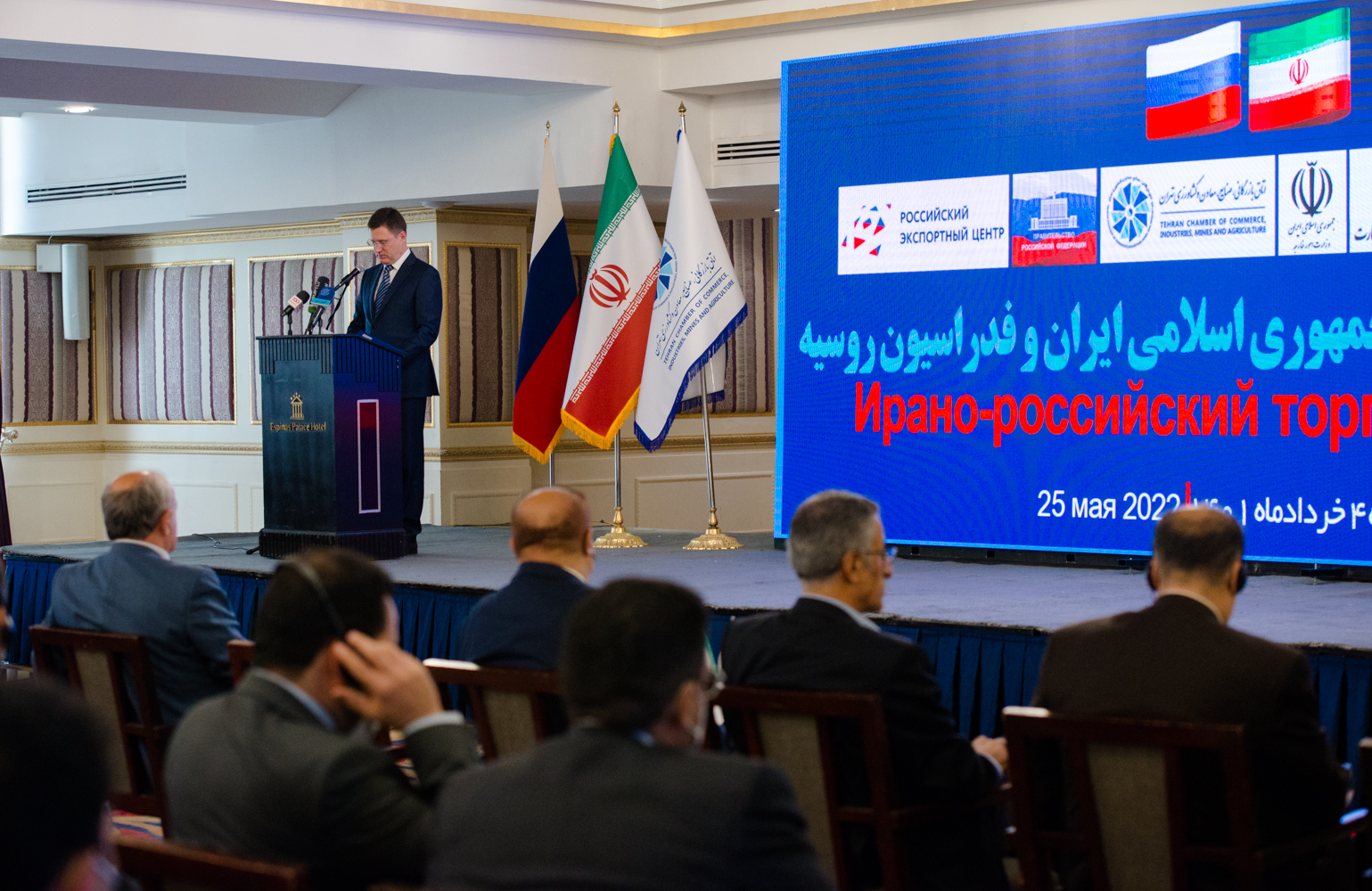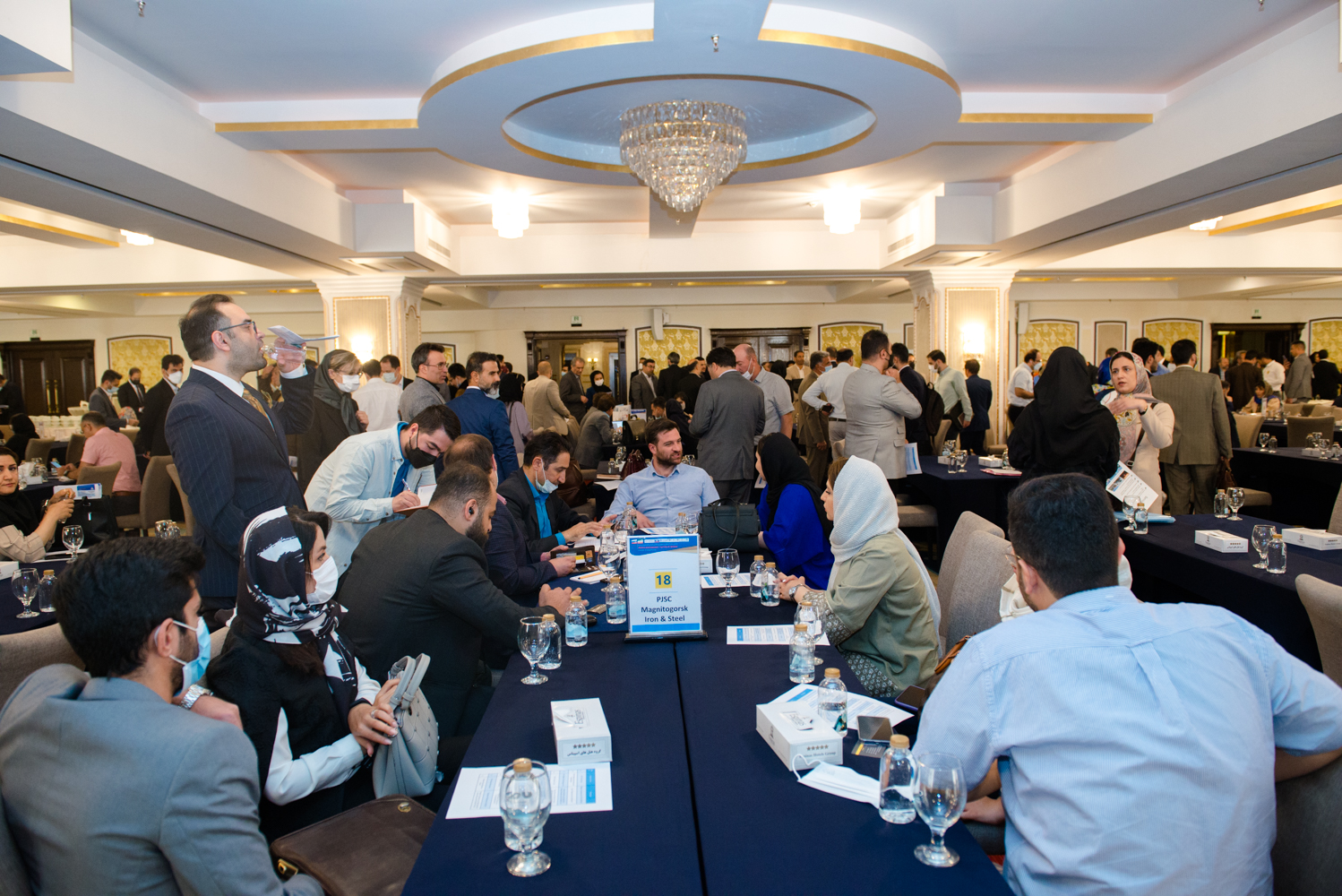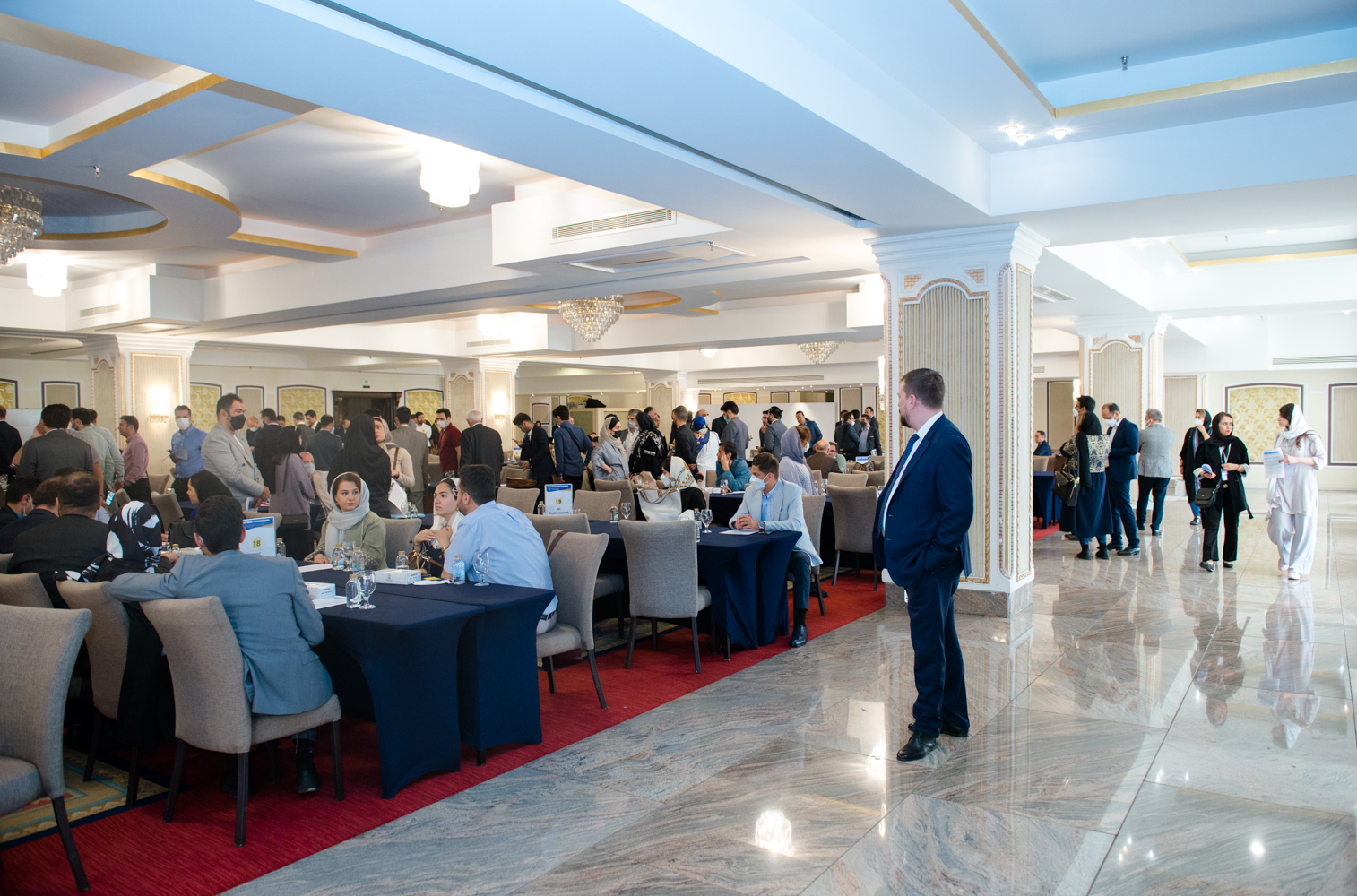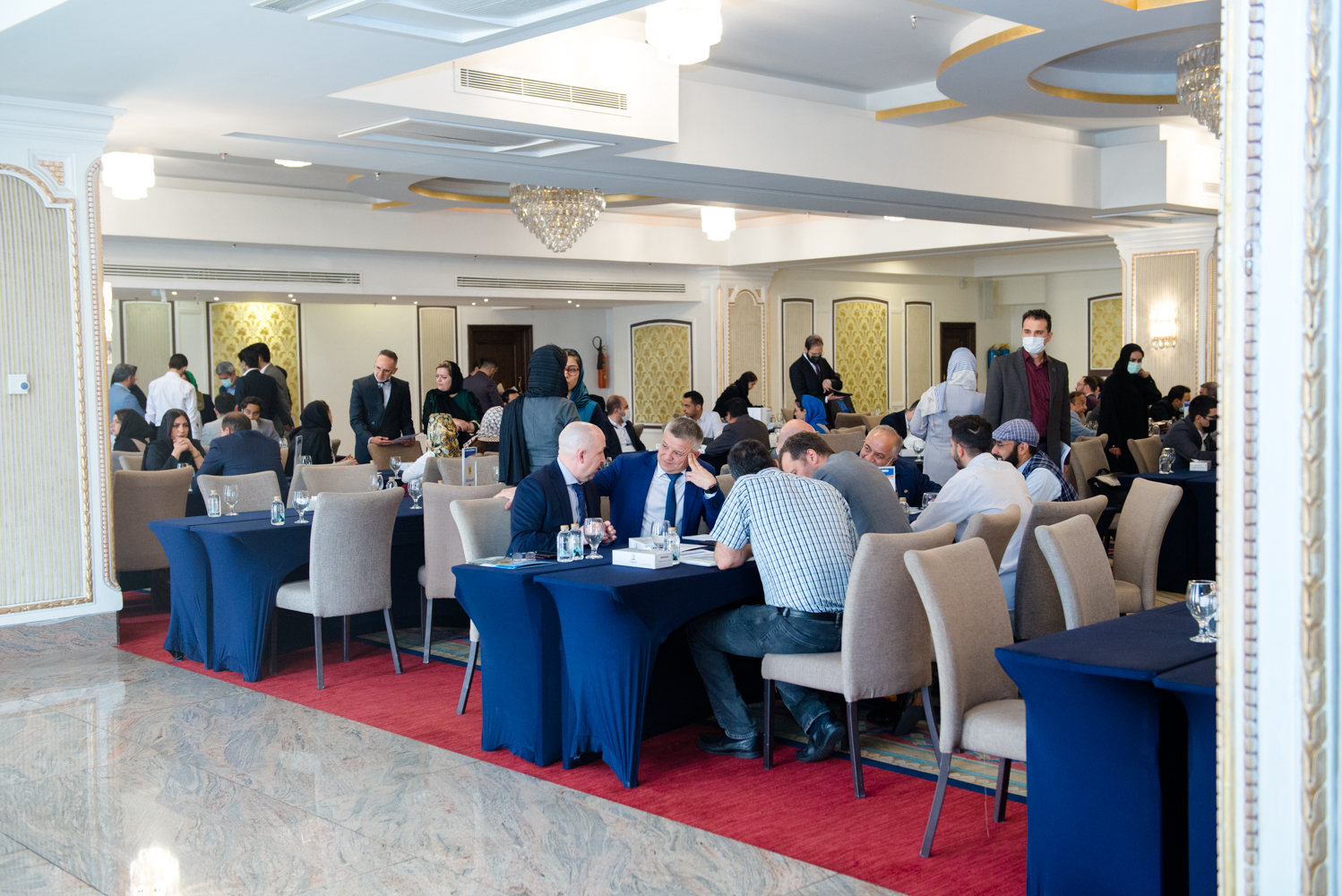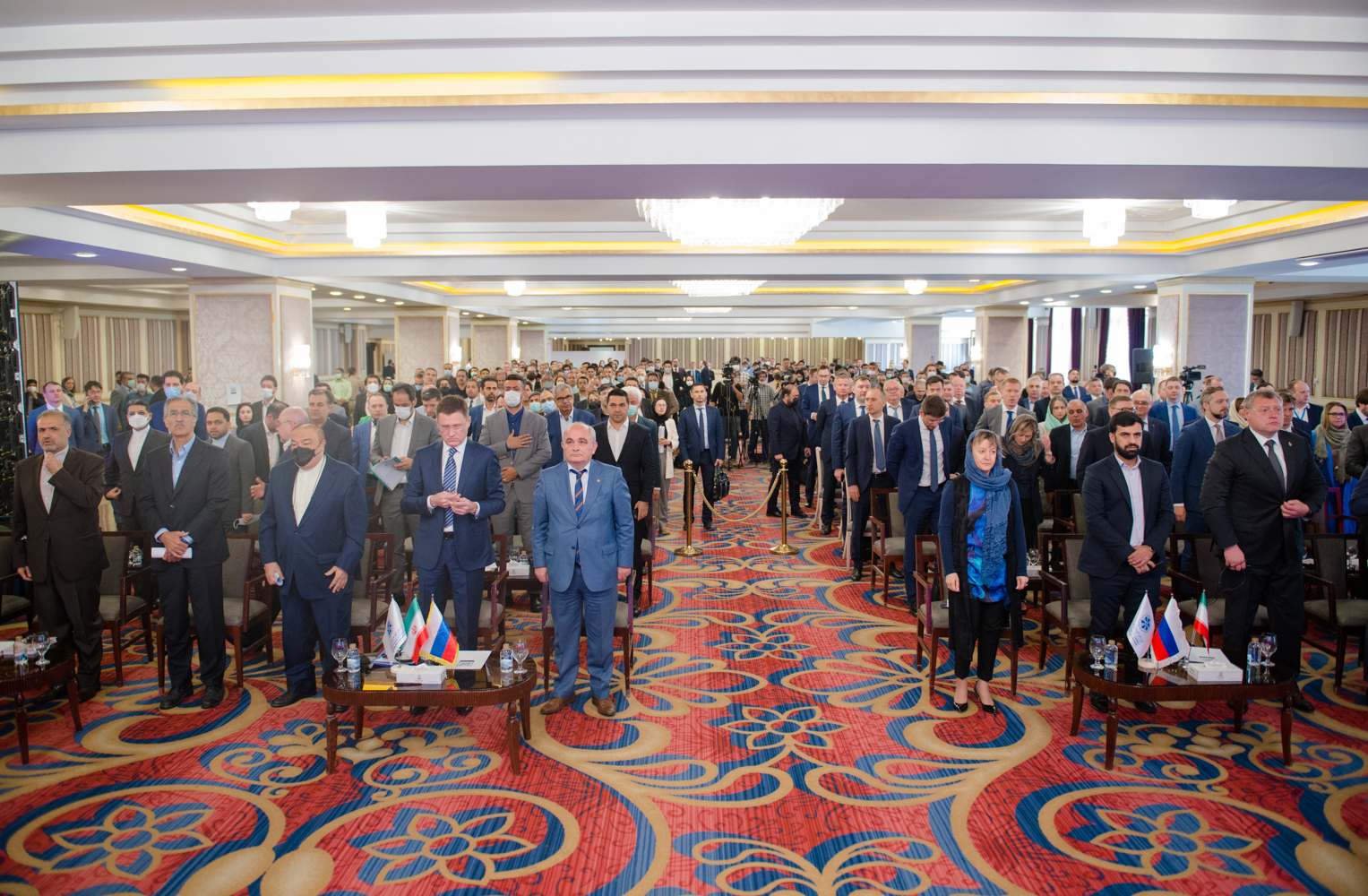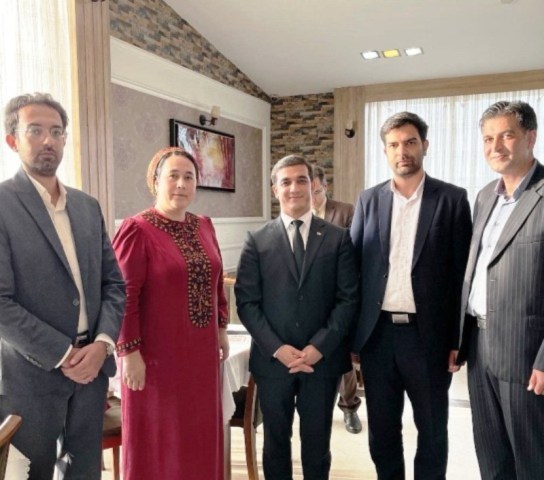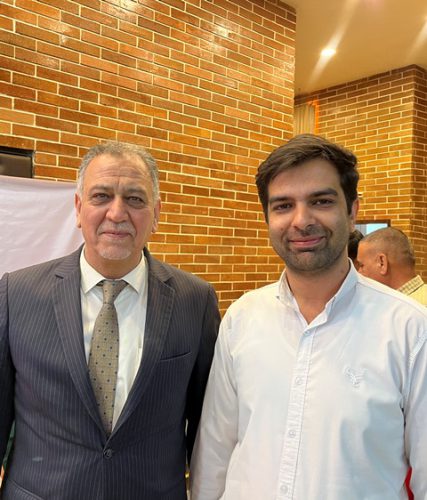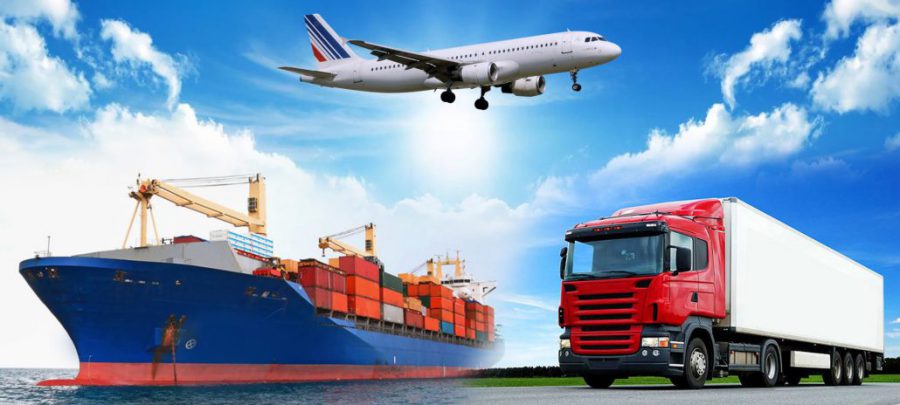The trade delegation of the Russian Federation, headed by the Deputy Prime Minister of the Russian Federation, arrived in Tehran. The event was attended by a large number of Iranian businessmen and companies who had come to the conference venue for direct talks. In addition to the President of the Tehran Chamber, the Minister of Industry, Mines and Trade of Iran, the Deputy Minister of Economic Diplomacy of the Ministry of Foreign Affairs, the Deputy Minister of Industry, Mines and Trade for Trade, the Iranian Ambassador to Moscow and the Ambassador of the Russian Federation in Tehran were also present. During the speech, they presented the views and strategies for the development of economic cooperation between the two countries.
At the conference, Alexander Novak, Deputy Prime Minister of the Russian Federation, announced the reduction of some import restrictions by the country and reminded that part of the empty market left by Russia due to recent sanctions against the country will be supplied through Iranian products. . Also, the head of Iran’s Trade Development Organization announced the signing of a free trade agreement between Iran and the Eurasian Economic Union in September this year, and in connection with the banking openings between Iran and Russia, announced that the establishment of a quasi-Swift system between the two countries is being completed.
The Iran-Russia Joint Trade Conference began with a welcome speech by Hesamuddin Hallaj, Deputy Minister of International Affairs of the Tehran Chamber of Commerce, to Russian and Iranian attendees, and government and private sector officials of the two countries, followed by speeches by these officials. At the end of the conference, representatives of Iranian and Russian companies sat at the negotiating table to explore ways to create and develop cooperation
Bilateral efforts to remove obstacles to economic cooperation
According to the Tehran Chamber of Public Relations, Massoud Khansari said: “In the regional and global perspective, Iran-Russia relations are based on the principle of mutual respect and peaceful coexistence.” Regional developments have always led to greater cooperation between Iran and Russia, and the two countries have common interests and alignment in Central Asia, the Caspian Sea, the Caucasus and the Persian Gulf, taking into account geopolitical, geostrategic, geoeconomic and energy capabilities.
Referring to the imposition of illegal Western sanctions on Iran and Russia, he said that this issue is a factor in closer relations between the two countries and the promotion of trade relations, which is a great incentive for cooperation between the two neighbors in various fields including energy, transportation, information technology, mining. , Has created medicine and medical equipment, food industry, agriculture, scientific topics, etc.
Khansari continued: The visit of Mr. Raisi, the President of Iran to Russia and the exchange of various delegations at other levels between the two countries after that, has had a direct impact on strengthening Iran’s exports to Russia, especially since the beginning of the conflict with Ukraine. The signing of a free trade agreement with the Eurasian Economic Union, which was previously implemented temporarily, will further streamline this process, as well as reduce the role of the dollar in bilateral trade and expand the unprecedented expansion of cooperation to $ 10 billion in the first phase. It will expand to $ 25 billion in the next stages. In addition, the use of purity of goods between the private sector traders of the two countries with the support of governments will improve economic partnership.
Massoud Khansari Using Iran’s Capacities and Experiences in Reducing and Neutralizing Sanctions, Establishing a Rail Transport Consortium between Iran, Russia, Kazakhstan and Turkmenistan Due to Limited Maritime Transport Capacity and Increasing Demand for Transit Goods from Turkmenistan, Activation of the Second Magaram Customs Border Kensky on the south side of the current border to expand road transport, add combined rail travel including open and closed wagons, refrigerated wagons and a platform to transport refrigerated containers from Moscow to Astara in Iran to mitigate the pressure of road and sea transport in the event of joint ship shortages. Industrial between the two countries Due to the unprecedented growth of Iranian activists in the field of knowledge-based to meet the needs of industrial products, the establishment of electronic channels between Iranian and Russian customs to clarify the procedure of exchange of documents, dredging operations of the Volga River by Iranian businesses in clearing with inputs Livestock and edible oils,He cited the transfer of some ships with a capacity of less than a thousand tons by Russia from the Black Sea to the Caspian Sea and the reduction of General Cargo’s interest rates as suggestions for improving bilateral and multilateral relations.
The head of the Tehran Chamber of Commerce further pointed out that the chambers of commerce in Iran have about 50,000 members and in all areas of trade and economics, and have a high share of GDP, the readiness of the private sector to cooperate fully with the private sector. Russia declared in all areas. He said that now that the two countries have more understanding in regional and global issues, meeting the needs of the other side in complementary capacities will lead to the deepening of relations and the stabilization of economic cooperation.
At the end of his speech, Massoud Khansari said: “I ask the esteemed Russian businessmen and colleagues to raise the problems and obstacles in trade with Iran in a transparent manner so that the Tehran Chamber of Commerce can use its efforts to eliminate or minimize them.”
Reduction of import restrictions by the Russian Federation
At the event, the Deputy Prime Minister of the Russian Federation announced Russia’s trade plan to expand trade with Iran by 10% in 2022 compared to the volume of trade last year.
Alexander Novak said that the Russian government is seeking to strengthen the domestic economy and expand trade cooperation with neighboring countries by increasing the country’s imports from the union by 15%, following the situation in Russia in recent months and the imposition of some sanctions by Western governments. “One of Russia’s policies in the current situation is to facilitate the import of products needed by this country, and additional financial and budget packages have been approved for some regions of Russia in order to develop economic infrastructure in these regions,” he said.
Explaining that the Russian government is taking steps to further support trade and business in the country, he added: “The adoption of new laws to facilitate the import of some products needed by Russia, including medical equipment, raw materials for some industries and services.” Construction and engineering is another measure taken by the government of the Russian Federation.
The Russian Deputy Prime Minister then reminded that following the imposition of sanctions against Russia, a large number of deficiencies and shortcomings have appeared in the Russian market, adding: “We seek to fill the gaps in the Russian market with Iranian products.”
Novak reiterated that the Russian Federation has eased import restrictions imposed before the sanctions against Russia, adding that in the field of financial and monetary exchanges, guaranteed regulations have been implemented in Russia. Cooperation with Iran can be implemented.
Iran’s attitude towards relations with Russia is genuine and long-term
Following the meeting, the Deputy Foreign Minister for Economic Diplomacy stood behind the podium and said, referring to the growing trend of Iran-Russia economic relations: “Fortunately, Iran-Russia relations, especially in the economic field, have grown and Last year, there was a significant increase in the volume of trade. However, it must be acknowledged that the economic capacities of the two countries are far beyond these figures and measures, and efforts should be made to provide the necessary infrastructure to further exploit these capacities to develop relations between the two countries.
Mehdi Safari, also referring to the interactions between government officials and representatives of the private sector of the two countries, to remove obstacles to the development of economic cooperation, expressed hope that by implementing agreements in various fields such as energy, transportation, logistics centers, facilitate and Increase traffic at border crossings, customs, standards and investor protection, in addition to increasing trade, accelerate the implementation of joint projects.
The Deputy Minister of Economic Diplomacy of the Ministry of Foreign Affairs stated that “in addition to bilateral economic cooperation, the two countries can provide the ground for presence and activity in third markets through cooperation and synergy.” Produced by the two countries, to produce and export goods and services to other countries.
Safari continued: “Based on the principles of foreign policy, Iran has a special interest in developing relations with neighboring countries, especially Russia, and our attitude towards relations with Russia is genuine and long-term and is not affected by regional and international developments and is not affected by relations with other countries.” .
He stressed: “In addition to trying to increase trade and meet mutual import needs, we are interested in providing the ground for Russian investors in Iran to produce goods and services needed by the two countries, as well as exports to third countries;” Iran’s geographical location and the existing road, rail, sea and air communication routes between the two countries and the plans for their development provide a great opportunity for the transit and export of Russian products from the territory of Iran to other countries.
Safari then spoke about the readiness of the Iranian Ministry of Foreign Affairs to facilitate and strengthen relations and cooperation between economic actors of the two countries.
Preparations for the reopening of the Russian Export Office in Tehran
The head of the Russian Export Center, in a speech at the conference, noting that one of the center’s priorities is to develop Russian trade relations with Iran, announced the reopening of the Russian Export Center’s representative office in Tehran in the near future. The work of this representative office will expand the field of exchange of trade delegations between the two countries and direct negotiations between companies of the two sides.
Ms. Veronica Nikishina also announced the center’s readiness to set up a permanent pavilion for Russian-made products in Iran, adding that exports of agricultural products from Iran to Russia, as well as joint production of petrochemical products and the manufacture of industrial machinery in Iran, are opportunities for cooperation between the two. Is the country. He added: “The Russian Federation is ready for any cooperation and participation in the products that are in the first priority of production in Iran.”
In September 2020, the Tehran Chamber of Commerce and the Russian Export Center signed a memorandum of understanding on joint cooperation in the development of trade in goods and commercial services, including inquiries into the status of companies in the two countries.
Establishment of a special working group to resolve trade problems between Iran and Russia
The next speaker at the conference was the Deputy Minister of Industry, Mines and Trade for Trade. At the beginning of his speech, Mohammad Sadegh Mofteh referred to the good and long-standing political and economic relations between Iran and Russia and said that the exchange of political and economic delegations between the two countries shows the importance of developing bilateral cooperation.
He went on to point out Iran’s capabilities, including rich resources, access to open waters, climate diversity, young and educated labor, and said that Iran has the capacity to become a regional hub for investment, production and joint exports to Middle Eastern countries. has it.
Emphasizing that the imposition of unfair international sanctions against Iran has led to progress in the industrial and service sectors, Mofteh added: “Our country has a good capacity to export agricultural products, food, construction materials, automobiles, parts, knowledge-based products and nanotechnology.” It has other areas. At the same time, Iranian companies in the field of technical and engineering services also have capabilities and have implemented large projects in different countries. Therefore, given the existing capabilities, we welcome cooperation with Russia in all areas.
“Russian investment companies can invest in various industrial, mining and development projects, oil, gas and petrochemicals, or jointly with,” he said. Iranian companies to cooperate.
Mofteh stressed: in order to activate economic diplomacy and facilitate trade between the two countries, government departments should remove banking barriers and facilitate monetary exchanges, remove barriers in the transportation sector and equip it, accept the results of laboratories, facilitate customs regulations, eliminate or Reduce export duties and establish direct contact with chain stores.
He then announced the formation of a special working group at the level of the first vice president with the presence of the directors of the Trade Development Organization and relevant ministries, to pursue the development of trade cooperation with Russia, and said: To solve problems and provide the items needed by Russia.
Activation of interbank relationship between Iran and Russia
The head of the Trade Development Organization of Iran in the conference said that the lack of mutual recognition of businessmen and companies of the two countries is one of the problems in the development of economic relations between the two countries and said: Countries have been formed, including the Republic of Azerbaijan, which should provide a direct link between traders and companies of the two countries by eliminating intermediaries, and in this regard, the Trade Development Organization of Iran and its corresponding institution in Russia can play an important role.
Alireza Peymanpak, referring to the efforts of the Iranian and Russian governments to expand relations and remove obstacles to joint economic cooperation between Iranian and Russian businessmen, added: “Negotiations on the Eurasian Free Trade Agreement have been accelerated by Iran and the negotiating countries in this union.” Thus, at the beginning of the second half of this year, the Free Trade Agreement between Iran and the Eurasian Economic Union will be signed.
Deputy Minister Samat then emphasized on the development of cooperation between Iran and Russia in the field of logistics and customs, announced the holding of some talks on monetary and banking cooperation between the two countries and added: “Good talks have been held between the two sides in the field of mutual trade insurance.” A cooperation agreement in the field of guarantee funds between Iran and Russia will be signed soon.
Peymanpak also referred to the formation of some interactions and cooperation between the Central Banks of Iran and Russia, adding: “Soon, the interbank professional system between the two countries will be activated and the creation of a quasi-SWIFT system between Iran and Russia is being pursued.”
We should not repeat the mistakes of the past
Russia’s ambassador to Iran, Lavan Jagarian, also said that a new chapter in relations between the two countries was expected to open after the Iranian president’s recent visit to Russia. And agreements were signed between the two parties; Unfortunately, most of these contracts were not implemented and the agreements were somehow forgotten.
“We must not repeat the mistakes of the past,” he said in another part of his speech; It should be noted that the provinces of Iran and Russia have a lot of capacity to develop relations, and these capacities should be used to improve the level of relations. Jagarian also spoke about the readiness of the Russian Embassy in Iran to help Iranian businessmen enter the Russian market and cooperate with Russian companies.
The need to solve the transit problems of Iran and Russia
Kazem Jalali, Iran’s ambassador to Russia, also said that the will of the governments in Iran and the Russian Federation has been formed to expand economic and trade relations, pointing to some obstacles to the development of relations, including transit. He said that according to him, the two countries should make openings in this area as soon as possible.
He pointed out that there is a land connection between Iran and Russia through the Republic of Azerbaijan and the Samur border in this country, adding that this border should be expanded to reduce the congestion of trucks moving between the two markets.
Emphasizing that the seaports, which are another transit area between Iran and Russia, should be developed and strengthened, Jalali added: “Dredging the Volga River, through which the maritime transit of the two countries takes place, is necessary and this should also be done by The two countries should be on the agenda. The Iranian ambassador to Moscow also noted the acceleration of the development of the Rasht-Astara railway line, noting that the plan should be completed jointly by the two countries.
He also cited the conversion of the two countries’ currencies into trade between the two sides as another obstacle to expanding relations, adding that there were also customs problems that the two countries should address as soon as possible.
At the end of the part related to the speech of the officials of the two countries in this event, economic activists from Iran and Russia started direct and face-to-face talks on economic cooperation.
Potential opportunities for cooperation with Iran
Following the conference, Alireza Kolahy Samadi, a member of the Tehran Chamber of Deputies, presented a report on Iran’s capabilities and capabilities for cooperation with Russia. “Iran and Russia’s trade and economic opportunities have been overlooked,” he said, drawing a picture of potential opportunities in Iran. “Iran has the highest rate of urbanization in the Middle East, and this shows the size of the consumer market in this region,” he said. Also, the presence of young people and the number of university graduates, which is equal to the number of American university graduates, is another capacity of Iran.
The head of the Industry and Mining Commission of the Iran Chamber then pointed to the increasing share of the digital economy in the Iranian economy and said: “The imposition of sanctions against our country, which is about 10 years old, has forced Iran to import some of its products Russia is apparently in a similar position right now.
“One of the areas in which Iran can benefit from Russian knowledge is in the field of mining,” said Samadi Samadi. According to the McKinsey Institute, the value of Iran’s mineral resources is about $ 27 trillion, and cooperation with Russia in this area can expand Iran’s mineral capital. In this case, it will be possible to compensate for the decline in Iran’s revenues from the decline of oil over the next 10 years from the development of the mining sector.
The member of the Tehran Chamber of Deputies further mentioned economic diversity, investment opportunities, neighborhood with eleven countries and low effective tax rates in Iran as part of the attractiveness of the Iranian market and said: “We hope that the presence of this trade delegation from Russia in Iran will become Be a turning point to activate potential opportunities in Iran.
Iran needs to import 25 million tons of grain
The head of the Agriculture and Convertible Industries Commission of the Tehran Chamber also dedicated the subject of his speech to the opportunities in the grain trade between Iran and Russia. Kaveh Zargaran, noting that grain production in Iran has been declining due to weather conditions, said that due to reduced rainfall, Iran imported 22 million tons of grain last year.
Referring to some forecasts about the need to import at least 7 million tons of wheat this year, he said: “The average consumption of barley in Iran is about 6.5 million tons, which is expected to import 4.5 million tons of barley this year.” Last year, imports in this sector were about 3.3 million tons.
Zargaran also pointed out that the largest volume of corn imports is probably 10 million tons, adding: “Iran’s need to import grains and oilseeds this year is estimated at about 25 million tons and it seems that the Russian delegation in Iran can Be effective in providing it. However, Iran is not waiting and some of these required items have been provided in advance. But the exchange of grain needed by Iran can increase the level of trade between the two countries
